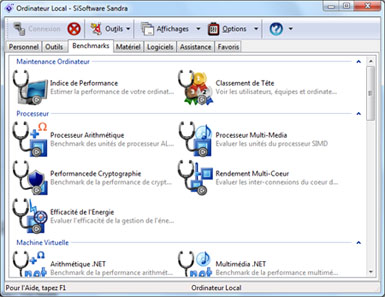SiSoftware publie sa nouvelle version : Sandra 2014 SP1 [MAJ]

L’éditeur SiSoftware vient de sortir une nouvelle version de son logiciel de benchs et d’informations systèmes. Le nouvel opus porte le nom de Sandra 2014 SP1. La mise à jour apporte une flopée de changements et d’améliorations comme vous pouvez le voir dans le changelog ci-dessous, dont deux nouveaux benchmarks pour les CPU et les GPU.
-> Télécharger Sandra 2014 SP1 (version 2014.02.20.18)
Mise à jour : Après la version 2014.02.20.17 publiée hier, SiSoftware vient de mettre en ligne la version 2014.02.20.18 de son logiciel. Celle-ci corrige un soucis qui pouvait causer problème avec les systèmes un peu anciens.

Changelog officiel de Sandra 2014 SP1 (en anglais) :
* IMPORTANT UPDATE *
– Slowed-down the colour palette cycling in Video benchmarks (DirectX / OpenGL) to prevent possible epileptic fit due to possible flashing / rapidly changing image on the latest video cards. Please ensure you use this version if you are using those benchmarks!
Modern video cards have become very fast even with complex pixel shaders; cycling was added to ensure each frame is different and thus re-computed; however, this meant modern graphics cards cycle too fast through the entire palette making the image « flash » which may be problematic for some people.
* New CPU benchmarks: Quad-Precision floating-point (FP128) *
Since x64 and its deprecation of FPU ISA, we « lost » the legacy 80-bit precision and been « stuck » with SSE/AVX double/FP64. While for most applications single/FP32 is sufficient – for complex scientific, financial workloads the loss of intermediate computation precision can become significant.
IEEE has recently standardised quad/FP128 which now can appear in future FPU SIMD units, which makes sense as we move to 512-bit SIMD which can can 4 128-bit quad-precision floating point values.
For now, we have to use software emulation using double/FP64. This can be accelerated using SIMD (i.e. SSE/AVX) in some cases – however complex functions (e.g. cos/sin, log/exp, sqrt, etc.) are somewhat problematic.
– Emulated using double-precision (FP64) where available.
– Ready to compare to future native FP128 precision support, i.e. future SIMD ISA.
* New GP benchmarks: Quad-Precision floating-point (FP128) *
While GPUs have « recently » gained double/FP64 support, they are may gain gain quad/FP128 support sooner than FPUs – which does make sense as even modern wide vectorised FPUs cannot match GPGPU floating-point computational power.
We will naturally first see native support through extensions (like AMD’s FP64) before final standardisation.
For now we use either double/FP64 emulation (similar to FP64 emulation through single/FP32) and also single/FP32 as a fallback which works under limited value range.
– Emulated using double-precision (FP64) where available.
– Emulated using single-precision (FP32) otherwise but extremely slow.
– Ready to compare to future native FP128 precision support, i.e. future GPGPUs.
* Updated GP benchmark: Scientific Analysis OpenCL *
– Previously only CUDA version was enabled on all cards.
– 3 common algorithms: GEMM (matrix multiply), FFT (fast Fourier transform), N-Body simulation enabled for OpenCL
– FFT forward and FFT inverse included. Improved FFT performance by pre-computing transcendentals.

Désolé, les commentaires sont fermés.